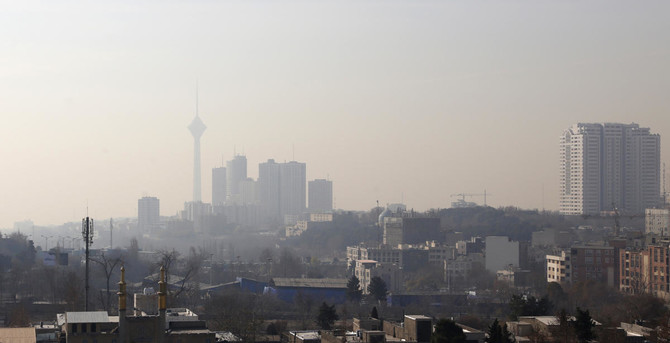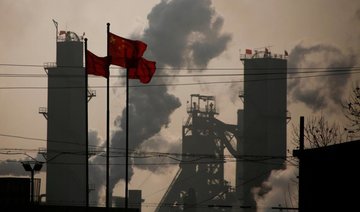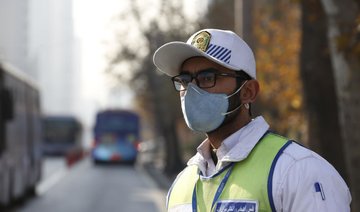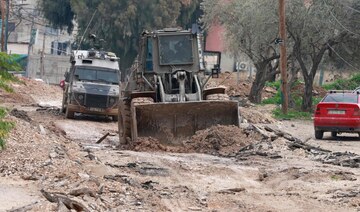TEHRAN: Primary schools will be closed on Monday in Tehran as thick fog caused by pollution smothers the Iranian capital and most of the surrounding province, local authorities said.
They also announced Sunday they would impose traffic restrictions in Tehran, home to 8.5 million inhabitants, allowing cars onto the streets in alternating shifts, depending on their number plates.
Similar measures were taken in December when primary schools in Tehran and most of its province were forced to close for several days because of the pollution.
Average concentrations of the finest and most hazardous airborne particles hit 144 microgrammes per cubic meter in Tehran on Sunday and peaked at 169 in some areas, municipal authorities said.
That is far above the World Health Organization’s recommended maximum of 25 microgrammes per cubic meter on average over a 24-hour period.
The microscopic particles lodge deep in the lungs and are harmful to human health.
Local authorities urged the most vulnerable people — children, pregnant women, the elderly and those suffering from heart problems — to remain indoors.
Every year, Iran’s sprawling capital suffers some of the worst pollution in the world when cool temperatures cause an effect known as temperature inversion.
The phenomenon creates a layer of warm air above the city that traps in the pollution produced by more than eight million cars and motorbikes.
This year the situation has been exacerbated as the country has seen very little rainfall.
Iranian media reports say 80 percent of the pollution in Tehran is caused by fumes from vehicle exhaust pipes.
High pollution shuts schools in Tehran
High pollution shuts schools in Tehran

Israel says 8 hostages due for release in first phase of truce are dead

“The families have been informed of the situation of their relatives,” Mencer told reporters, without providing the names of the deceased.
That means that of the 26 hostages yet to be freed under the first phase of the agreement, only 18 are still alive.
The truce deal, announced earlier in January after months of fruitless negotiations, took effect on January 19, bringing to a halt more than 15 months of war sparked by Hamas’s October 7, 2023 attack.
Under the first phase of the agreement, 33 hostages held by militants in Gaza are to be released in exchange for more than 1,900 Palestinians held by Israel.
Seven Israeli women have been released since the start of the truce, as have 290 Palestinian prisoners.
Bahraini king, crown prince meet Italian PM in Manama

- King Hamad welcomed Giorgia Meloni at Al-Gudaibiya Palace
- They discussed bilateral relations, ways to boost cooperation
LONDON: Bahraini King Hamad bin Isa Al-Khalifa received Italian Prime Minister Giorgia Meloni in Manama on Monday.
The Italian premier embarked on an official visit to the Middle East this week, meeting the Saudi leadership in AlUla on Sunday before heading to the Bahraini capital.
King Hamad welcomed Meloni at Al-Gudaibiya Palace in the presence of Prince Salman bin Hamad Al-Khalifa, the crown prince and prime minister.
They discussed bilateral relations and ways to boost cooperation in economics, trade and investment, according to the official Bahrain News Agency.
The king commended Italy’s efforts to promote peace and highlighted the importance of dialogue and diplomatic solutions to address regional as well as global issues, the BNA added.
Meloni expressed her gratitude for King Hamad’s warm hospitality and his efforts to strengthen historical relations between Rome and Manama.
King Hamad hosted a luncheon in honor of the Italian prime minister and her delegation.
Palestinians say two killed in Israeli West Bank strike

- Official Palestinian news agency Wafa identified the two killed as Ramez Damiri and Ihab Abu Atwi, both residents of the Nur Shams refugee camp
TULKAREM: The Palestinian health ministry said Monday two Palestinians were killed in an Israeli air strike in the occupied West Bank city of Tulkarem, an attack confirmed by the Israeli military.
The Ramallah-based ministry said in a statement that two dead and three injured arrived at Tulkarem’s Governmental Hospital “following the occupation’s targeting of a vehicle in Nur Shams refugee camp,” adjacent to the city of Tulkarem.
The Israeli army confirmed the strike, and said in a statement that “in a joint operation by the Israeli army and the Shin Bet (internal security agency), an air force aircraft launched an attack shortly ago in the Tulkarem area.”
Official Palestinian news agency Wafa identified the two killed as Ramez Damiri and Ihab Abu Atwi, both residents of the Nur Shams refugee camp.
The health ministry also announced the death of a young man killed Sunday night by Israeli forces in Qalandiya refugee camp, north of Jerusalem.
The ministry reported one dead and two injured “by (Israeli) bullets near Qalandiya camp.”
Wafa news agency identified the man killed as Adam Sab Laban, shot by Israeli forces who were stationed at a military tower by the Qalandiya checkpoint into Jerusalem, and who “opened fire at a group of citizens.”
Violence has soared throughout the West Bank since the war in Gaza broke out on October 7, 2023.
Israeli troops or settlers have killed at least 861 Palestinians in the West Bank since the start of the Gaza war, according to the health ministry.
At least 29 Israelis have been killed in Palestinian attacks or during Israeli military raids in the territory over the same period, according to Israeli official figures.
Lebanon says Israeli fire kills one as residents try to go home

- The bloodshed came hours after the extension of a deadline for Israeli forces to withdraw from south Lebanon under a November ceasefire deal
BURJ AL-MULUK: Lebanon’s heath ministry said Israeli fire killed one person Monday and wounded seven others in the south, in a second day of violence as residents tried again to return to border villages.
The bloodshed, which one analyst said was unlikely to re-spark war, came hours after the extension of a deadline for Israeli forces to withdraw from south Lebanon under a November ceasefire deal.
The ministry said Israeli fire killed 24 returnees on Sunday.
“Israeli enemy attacks as citizens attempt to return to their towns that are still occupied have led... to one dead and seven wounded,” the health ministry said Monday in a statement.
It reported one dead and two wounded in the border town of Adaysseh, with others wounded in Bani Hayyan, including a child, as well as in Yarun and Hula.
Caretaker Prime Minister Najib Mikati said earlier Monday that Lebanon had agreed to an extension of the ceasefire deal between Hezbollah and Israel until February 18, after the Israeli military missed Sunday’s deadline to withdraw.
In south Lebanon, residents accompanied by the army were again trying to return to their villages, official media and AFP correspondents reported.
Hezbollah chief Naim Qassem is scheduled to deliver a televised address at 6:30 p.m. (1630 GMT).
In the village of Burj Al-Muluk, an AFP photographer saw dozens of men, women and children gathering in the morning behind a dirt barrier, some holding yellow Hezbollah flags, hoping to reach the border town of Kfar Kila, where the Israeli military is still deployed.
In the city of Bint Jbeil, an access point for many border villages, Hezbollah supporters were distributing sweets, water and images of former chief Hassan Nasrallah, who was killed in an Israeli strike in September.
Others handed out stickers celebrating the “victory from God” as women held pictures of slain Hezbollah fighters.
“They think they are scaring us with their bullets, but we lived under the bombing and bullets don’t scare us,” said Mona Bazzi in Bint Jbeil.
The official National News Agency (NNA) said that Lebanese “army reinforcements” had arrived near the border town of Mais Al-Jabal, where people had started to gather at “the entrance of the town” in preparation for entering alongside the military.
It said the Israeli army had “opened fire in the direction of the Lebanese army” near the town, without reporting casualties there.
“We waited in a long line for hours, but couldn’t enter,” said Mohammed Choukeir, 33, from Mais Al-Jabal, adding that Israeli troops “were opening fire from time to time on civilians gathered at the entrance of the town.”
In nearby Hula, where the health ministry reported two wounded, the NNA said residents entered “after the deployment of the army in several neighborhoods.”
Under the ceasefire deal that took effect on November 27, the Lebanese military was to deploy in the south alongside United Nations peacekeepers as the Israeli army withdrew over a 60-day period, which ended on Sunday.
Hezbollah was also to pull back its forces north of the Litani River — about 30 kilometers (20 miles) from the border.
Both sides have traded blame for delays in implementing the deal, which came after more than a year of hostilities between Israel and Hezbollah, including two months of all-out war.
Lebanon’s army said Sunday that it had entered several border areas including Dhayra, Maroun Al-Ras and Aita Al-Shaab.
An AFP photographer in Aita Al-Shaab on Monday saw widespread destruction, with newly returned families among the ruins of their homes, as bulldozers worked to open roads and rescue teams searched for any bodies leftover from the conflict.
Israeli military spokesman Avichay Adraee on Monday called again for south Lebanon residents to “wait” before returning.
Hilal Khashan, professor of political science at the American University of Beirut, said he did not expect a return to major violence.
“Hezbollah no longer wants any further confrontation with Israel, its goal is to protect its achievements in Lebanon,” he told AFP.
The health ministry said Monday that Israeli fire killed 24 people who were trying to return to their villages the previous day, updating an earlier toll of 22 dead.
The Israeli military had said soldiers “fired warning shots to remove threats” where “suspects were identified approaching the troops.”
The Lebanese army said Sunday it would “continue to accompany residents” returning to the south and “protect them from Israeli attacks.”
19 arrested after Turkiye hotel inferno disaster

ANKARA: Turkish authorities have arrested 19 people as part of an investigation into a fire at a ski resort hotel that killed 78 people, Anadolu state news agency reported Monday.
Those detained include a deputy mayor for the town responsible for the Kartalkaya resort, a deputy fire chief and the head of another establishment belonging to the hotel owner, the agency said.
The investigation into the January 21 disaster has focused on the hotel management and the actions of the emergency services and authorities in the town of Bolu.
On Friday, the owner of the Grand Karta hotel, his son-in-law, the hotel’s chief electrician and its head chef were arrested.
Survivors and experts have highlighted the absence of fire alarms and sprinklers, working smoke detectors and proper fire escape routes at the 12-story building that overlooked the ski slopes.
Interior Minister Ali Yerlikaya has said 238 people were staying in the Grand Karta hotel when the inferno tore through the building in the middle of the night.




















